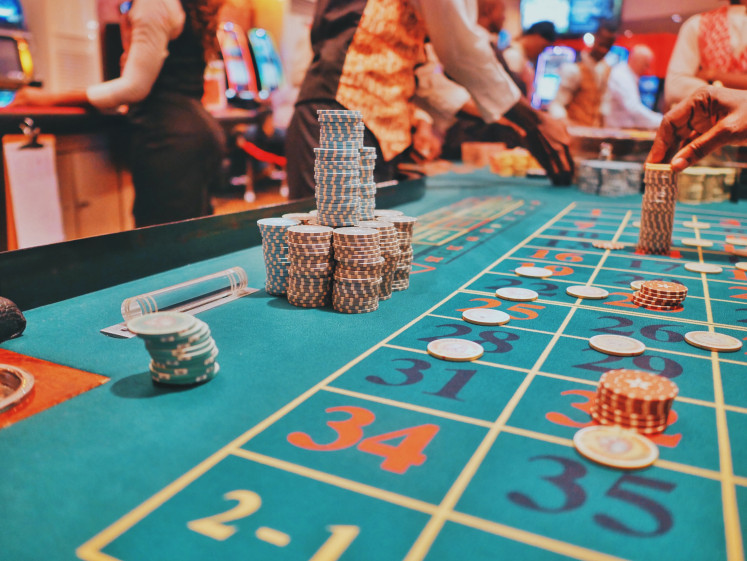Bad obsession: Online gambling addicts share stories of lost and pain
While gambling is considered a fun hobby, for some people addiction can affect their health and well-being, and interfere with daily life.
Change text size
Gift Premium Articles
to Anyone

W
hile gambling is considered a fun hobby, for some people addiction can affect their health and well-being, and interfere with daily life.
Tomos still remembers how he became hooked on online betting. It all began with sports gambling.
“I started out betting on soccer and basketball games as a university student. At that time, I only did it for fun,” the 29-year old who chose not to use his real name for fear of embarrassment, said.
Two years ago, he became immersed in a blackjack game hosted at a local online casino and things quickly took a downward spiral.
“I began with a Rp 500,000 [US$ 34] deposit. At first, I experienced a winning streak,” said Tomos, who works as a finance officer at a private company.
“Then, in the third and fourth week, I alternated between wins and losses. Since then, I increased my bets to around Rp 1-2 million.”
Occasionally, Tomos made a profit many times more than the amount he spent at the gaming house.
“My biggest win at the casino was Rp 10.5 million when I bet Rp. 2.5 million. On a soccer parlay bet, I staked Rp 500,000 in one night and won Rp 15 million,” he explained.
Like Tomos, 22-year-old Rara — also not his real name — started to engage in gambling through online sports betting.
“Three years ago, I got interested in soccer betting after I found out that a friend of mine won Rp 30 million with a Rp200,000 bet,” said Rara, who is a student living in Bogor.
Rara recalled how he had made a lot of profit in a very short time from soccer gambling.
“That night, I put a bet of Rp 200,000 and was able to win Rp 27 million,” said Rara, adding that he also dived into online slot betting 1.5 years ago.

Serious impacts
Global commercial gambling has become a growth industry. According to the Zion Market Research Study, the online gambling and betting market was worth around $61.5 billion in 2021 and is projected to grow around $114.4 billion by 2028.
While gambling can be a casual pastime for some, it can potentially result in mental and physical health problems. Extreme gambling is classified as a disorder by the World Health Organization (WHO).
In some cases, people have an uncontrollable desire to keep gambling despite the toll it takes on their daily life. Tomos explained that when he was tight on money, he did anything to feed his addiction.
“I borrowed money from legal and illegal online lenders. Until last year, the total amount of my loan was almost Rp 200 million. It will be completely paid off next year,” he said.
Tomos said, to pay off his debt, he lied to get financial help from his aunt.
"I told her that I needed money to make up for my losses in forex trading. If I had been honest and told her that I would like to borrow money to settle my gambling debt, she wouldn’t lend to me,” he said.
Meanwhile, Rara completely stopped gambling three months ago. Even so, he still has to pay off his debt to his fellow gamblers.
"In just a month, I accumulated Rp 11 million in debt. But now the amount of my debt has decreased to Rp 2 million," he said.
His past behavior also negatively impacted his education. “This semester I was late in submitting assignments and I didn’t participate in mid semester tests in two subjects because I couldn’t concentrate,” he said.
Alexandra Gabriella Adeline, a clinical psychologist from Smart Mind Centre Consulting in Jakarta, said gambling addiction can be categorized as obsessive behavior. Obsession correlates with a desire that constantly needs to be fulfilled.
“When the desire is not fulfilled, it persists and disrupts people’s thoughts and emotions. Thus, they can feel anxious or even have trouble carrying out their daily routine tasks,” said Alexandra.
In pathological gamblers, dopamine, a neurotransmitter that plays a role in pleasure, motivation and learning, is associated with gambling symptom severity.
"When people gamble, their brain releases the dopamine, which gives them a feeling of well-being and excitement,” Alexandra said.
One factor that influences individuals' urge to gamble is the desire to get instant achievement.
"In addition to the thrill of the wait and curiosity, they wish to obtain achievement in a short time. They may think life would be colorless without this sensation,” said Alexandra.

Overcoming gambling addiction
The gambling problem affected Rara psychologically. At his lowest point, he thought of committing suicide. Nevertheless, he reached out to his trusted friends.
“I talked about my problems with several high school friends and stayed away from friends who gamble,” he said.
Tomos' colleagues knew about his problem, yet they remained non-judgmental.
“They gave me a lot of support. My direct supervisor approached me to ask if I had a problem and even advised me to take time off. I feel grateful because I am surrounded by kind people," he said.
Therapy can also help people deal with gambling problems. One of the treatments is through motivational interviewing.
“Psychologists can use motivational interviewing methods to find out the causes of a gambling addiction and the appropriate coping mechanisms,” Alexandra said.
By using this method, psychologists help individuals with gambling addiction reinforce things that motivate them in life. Then, the clients are asked to analyze the impact of their behavior.
“If they are already aware that this is not right, we give them some techniques that can be practiced to lessen their desire to gamble,” she added.
As gambling addiction is almost similar to drug addiction (going through withdrawal symptoms when not betting), compulsive gamblers may need rehabilitation.
“To counteract addiction, an individual needs to go through a detoxification process. So, it is recommended to undergo rehabilitation at a treatment facility,” Alexandra said.
Tomos is self-aware about his problem, hence he decided to stop betting at online casinos. However, he also acknowledged that he cannot completely quit gambling.
“It may sound like a justification. But so far, I always keep my soccer betting under control. Now, I only spend a maximum of Rp 100,000 per month on soccer gambling,” he said.
As someone whose life had fallen apart due to problem gambling, Tomos does not want other people to go through the same grueling experience.
“Stay away from gambling if you can. If you can’t do it, you have to gamble moderately. Don't chase your losses because the house will always win,” he said.









